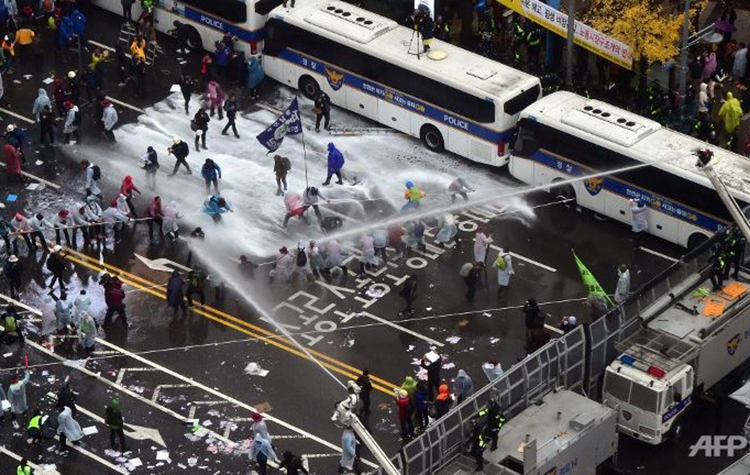(Bangkok, 25 November 2015) – The Asian Forum for Human Rights and Development (FORUM-ASIA), a regional human rights group, strongly condemns the violent police crackdown on protestors in Seoul, South Korea on 14 November 2015. Despite the repeated concerns raised by FORUM-ASIA on violations of freedom of assembly and the crackdown on peaceful protests [1], the Korean authorities’ suppression of human rights defenders and peaceful protestors continues. FORUM-ASIA sees this latest incident as indicative of the regression on democracy and human rights in South Korea.
On 14 November 2015, around 130,000 people gathered in Seoul to speak out on various human rights issues, including: labour and farmers’ rights; State-controlled history textbook; the Sewol Ferry disaster and the rights of lesbian, gay, bisexual, transgender, intersex, and questioning (LGBTIQ) people. A total of 52 civil society organisations were involved in the ‘2015 Peoples’ Rally’. While the protest was conducted peacefully, the authorities used excessively heavy weapons, including water cannons. The water cannons were used to blast almost 182 tons water and 651 litre of tear liquid on the protestors during this single day event. This resulted in dozens of human rights defenders and protestors being injured.
Among the injured was Mr. Nam-gi Baek, a 67 years old member of the Korea National Association of Farmers. He is still unconscious today due to a brain haemorrhage which resulted from being hit by the water cannons [2]. The police used a high-velocity stream of water loaded with a high level of capsaicin and tear gas liquid on the protestors. Witnesses and a human rights monitoring team at the scene said that the police targeted Mr. Baek indiscriminately. He was hit in the head and neck by the water cannons. The blast continued for 20 seconds, even though he fell down almost immediately after he was hit [3]. Mr. Baek’s being hit in the head and neck was a violation of Article 13 of the ‘Presidential Decree on standards of the usage of lethal force equipment’ and Section two of the ‘Operational Instruction on water cannons’. These state that a water cannon is only allowed to be used below the chest as well as that when protestors are injured, the police should provide emergency aid immediately.
“The Korean authorities must urgently and thoroughly investigate the use of excessive force against peaceful protestors, and bring those that are found to be responsible to justice. Indiscriminate firing into a group of people is never be allowed”, says Evelyn Balais-Serrano, Executive Director of FORUM-ASIA. “We are also concerned that the police used buses to barricade streets and restricted the movement of peaceful protestors. This can only be justified as a last resort when there is imminent, clear, and grave danger that cannot be prevented by dispersal of assembly according to the Constitutional ruling in June 2011[4]”
FORUM-ASIA is also concerned about the fact that the violent crackdown happened only a little over a week after the UN Human Rights Committee issued its recommendations to the Government of South Korea on the freedom of peaceful assembly.[5] On 5 November 2015, the Committee shared its concerns especially on the excessive use of force by law enforcement officials and bus blockades. The Committee called on the Korean authorities to “ensure the enjoyment by all of the freedom of peaceful assembly, and that limitations on the right to freedom of assembly are in strict compliance with article 21 of the Covenant” and “further review its regulations on the use of force and ensure they are in compliance with the Covenant, and train its police officials accordingly”.
“We echo the recommendations of the Committee. The Government of South Korea should train and strengthen the capacity of law enforcement officials in terms of policing assemblies and the use of force as provided for in the United Nations Code of Conduct for Law Enforcement Officials of 1979 and the Basic Principles on the Use of Force and Firearms by Law Enforcement Officials of 1990”, concludes Balais-Serrano. “As a re-elected member of the UN Human Rights Council, the Government of South Korea must set a good example for the promotion and protection of human rights.”
About FORUM-ASIA:
FORUM-ASIA is a Bangkok-based regional human rights group with 47 member organisations in 16 countries across Asia. FORUM-ASIA has offices in Bangkok, Jakarta, Kathmandu and Geneva. FORUM-ASIA addresses key areas of human rights violations in the region, including freedoms of expressions, assembly and association, human rights defenders, and democratisation.
For further inquiries, please contact:
- Betty Yolanda, Country Programme Manager, FORUM-ASIA, [email protected] +66 994250010
- Sejin Kim, Human Rights Defenders Programme Officer, FORUM-ASIA, [email protected] +66 926347034
Click here to download the press release (PDF)
[1] Press Release, FORUM-ASIA, South Korean: Violent Crackdown against Sewol Ferry Protesters Indicates Backsliding in Democracy, 26 April 2015. Open Letter, FORUM-ASIA, Condemn Crackdown on Miryang Protestors and Halt Construction Plans, 17 June 2014. Oral Statement, FORUM-ASIA, Universal Periodic Review (UPR) Plenary on the Republic of Korea, 19 March 2013.
[2] A list of injured people during the November 14 Demonstration and police brutality (Korean), Korean Federation Medical Activist Groups for Health Rights, http://kfhr.org/?p=127713
[3] Please see the video here (Korean), https://www.youtube.com/watch?v=ee4LjzHrnIg
[4] The Constitutional Court ruled that the use of bus blockades “can only be justifiably relied on as a last resort when there is imminent, clear and grave danger that cannot be prevented by granting conditional permission or by ordering termination or dispersal of assembly” (2009Hun-ma406).
[5] Concluding observations on the fourth periodic report of the Republic of Korea (CCPR/C/KOR/CO/4), 5 November 2015, http://tbinternet.ohchr.org/_layouts/treatybodyexternal/Download.aspx?symbolno=CCPR%2fC%2fKOR%2fCO%2f4&Lang=en




